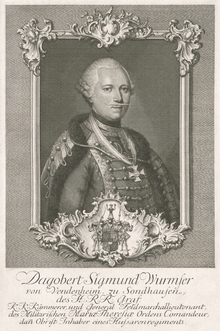This article includes a list of general references, but it lacks sufficient corresponding inline citations. (February 2015) |
Dagobert Sigmund von Wurmser | |
|---|---|
 | |
| Born | 7 May 1724 Strasbourg, Alsace, Kingdom of France |
| Died | 22 August 1797 (aged 73) Vienna |
| Allegiance | |
| Service | |
| Years of service | 1741–1763 (France) 1763–1796 |
| Rank | Field Marshal |
| Battles / wars | |
| Awards | 1778, Knight's Cross of the Military Order of Maria Theresa[1] 1789, Commander's Cross of the Military Order of Maria Theresa[1] 1793, Grand Cross of the Military order of Maria Theresa[1] |
| Other work | Imperial and Royal Privy Councilor; Imperial and Royal Chamberlain. |
| Signature | |
Dagobert Sigmund, Count von Wurmser (7 May 1724 – 22 August 1797) was an Austrian field marshal during the French Revolutionary Wars. Although he fought in the Seven Years' War, the War of the Bavarian Succession, and mounted several successful campaigns in the Rhineland in the initial years of the French Revolutionary Wars, he is probably most remembered for his unsuccessful operations against Napoleon Bonaparte during the 1796 campaign in Italy.
Although initially in the Army of France during the Seven Years' War, Wurmser left France after Louis reached a peace agreement with Britain, and joined the military of the House of Habsburg. He later took part in the short-lived War of the Bavarian Succession, also called the so-called Kartoffelkrieg (Potato War). During the French Revolutionary Wars, Wurmser commanded several imperial Habsburg armies on in the Rhine River valley between 1793 and 1795, and perhaps his most conspicuous achievement was the taking of the lines of Lauterburg and Weissenburg in October 1793.
In 1796, Francis II, Holy Roman Emperor sent him to northern Italy, where the Habsburg military defended Austria's southern territories. In a series of well-fought battles with the French army, under the command of the up-and-coming general Napoleon Bonaparte, Wurmser was trapped with his army in Mantua; after a negotiated capitulation, Wurmser left the city with his honors and 700 men, and marched back to Vienna. His defeat at Mantua did not diminish the luster of his service in imperial eyes—he was granted another appointment immediately—but he was an old man of 72 years who had spent most of his adult life in arduous campaigning. His health failed him shortly after his appointment and he died in 1797.